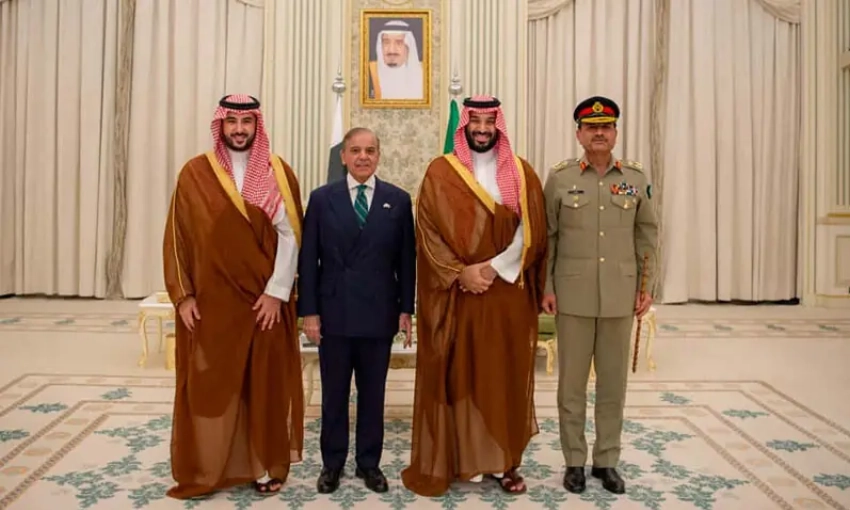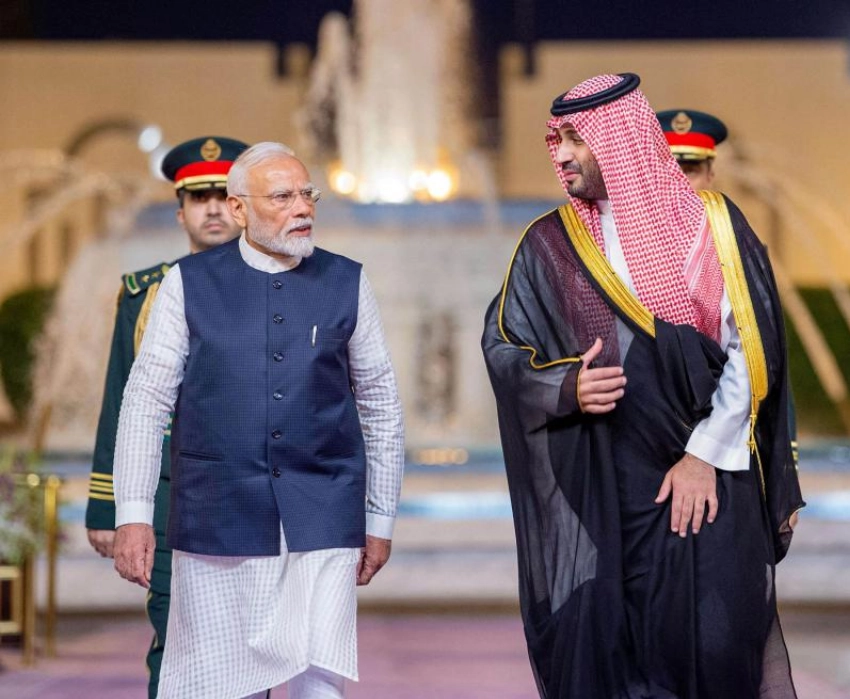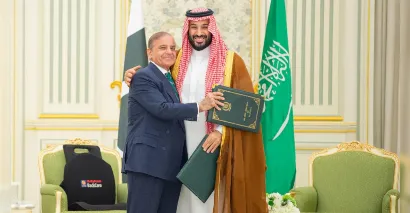Key Highlights
- Historic Partnership Formalized Through Defense Cooperation
- Key Provisions of the Pakistan-Saudi Arabia Defence Pact
- Nuclear Implications and Strategic Deterrence
- Context and Timing Significance of Region
- Strategic Response to Changing Security Landscape
- Response and Regional Implications of India
- Balancing Regional Relationships
- Historical Foundation of Pakistan Saudi Cooperation
- Military and Economic Cooperation Structure.
- Collaboration in the Defence Industry
- Security Architecture change in the Middle East.
- Conclusion
Pakistan and Saudi Arabia signed a groundbreaking mutual defence agreement on September 17, 2025, marking a pivotal moment in Middle Eastern geopolitics. The Strategic Mutual Defence Agreement declares that any aggression against either country will be considered an attack on both nations, potentially bringing Saudi Arabia under Pakistan's nuclear umbrella.
Highlights/TLDR:
-
Pakistan and Saudi Arabia signed the Strategic Mutual Defence Agreement on September 17, 2025, at Al-Yamamah Palace in Riyadh
-
The pact declares any aggression against either country as aggression against both, potentially extending Pakistan's nuclear umbrella to Saudi Arabia.
-
India expressed concerns and stated it will study the implications for national security and regional stability.
-
The agreement follows an emergency Islamic summit in Doha after Israel's attack on Hamas leaders in Qatar.
Historic Partnership Formalized Through Defense Cooperation
The pakistan saudi arabia defence pact was signed during Prime Minister Shehbaz Sharif's state visit to Riyadh, where he met with Crown Prince Mohammed bin Salman bin Abdulaziz Al Saud. This agreement builds on nearly eight decades of partnership between the two Islamic nations, rooted in brotherhood, Islamic solidarity, and shared strategic interests.
Saudi Crown Prince Mohammed bin Salman received Prime Minister Sharif at Al-Yamamah Palace in Riyadh, where both leaders held official talks with their respective delegations. The Prime Minister was escorted by Saudi Air Force jets upon entering Saudi airspace, demonstrating the significance of this diplomatic engagement.

Also Read: Australia Maintains Steady Migration Program for 2025-26 with Strategic Restructuring
Key Provisions of the Pakistan-Saudi Arabia Defence Pact
The mutual defence agreement contains several critical components that reshape regional security dynamics:
|
Provision |
Details |
Implications |
|
Mutual Defence Clause |
Any aggression against either country is treated as an attack on both |
Creates a formal military alliance |
|
Nuclear Deterrence |
Comprehensive defensive agreement covering all military means |
Potential nuclear protection for Saudi Arabia |
|
Regional Security |
Aims to achieve peace and stability in the region and globally |
Broader Middle East security framework |
Nuclear Implications and Strategic Deterrence
A top Saudi official acknowledged to Reuters that this is a total defensive agreement, which involves all forms of military means. Although the pact does not directly refer to nuclear arms, analysts far and wide decipher this language to possibly be an extension of n-deterrence to Saudi Arabia by Pakistan.
The historical security relationship between Pakistan and Saudi Arabia has been strong, and it has been reported that this kingdom funded the development of Islamabad's nuclear weapons. The Pakistani military trainers have been around Saudi Arabia for decades, and Saudi Arabia has been giving huge financial assistance during Pakistan's economic crisis.
Context and Timing Significance of Region
The pakistan saudi arabia defence agreement is amidst increased regional tensions following the military activities of Israel in the Middle East region. The last attack by Israel against Qatar, to kill Hamas leaders in Doha, has heightened the anxiety of the Gulf Arab states regarding their security systems.
Strategic Response to Changing Security Landscape
The United States is also losing its reliability in the eyes of the Gulf Arab countries as a traditional security guarantor. The treaty is a move towards regional security cooperation devoid of the traditional Western alliances.
The time is after a historic joint meeting of the Arab League and Organisation of Islamic Cooperation caused by the September 9 attack of Qatar by Israel. This background indicates that the defence agreement is a closer-range reaction to security threats as perceived.
Also Read: The Future of US Immigration: Trump Administration's New Push for 'Merit-Based' System
Response and Regional Implications of India

India stated that it will examine the Pakistan-Saudi Arabia defence pact and how it would affect the national security and stability in the region. The government spokesperson of the Ministry of External Affairs, Randhir Jaiswal, confirmed that the government was not unaware of this development being in the offing.
We have heard that a mutual defence pact between Pakistan and Saudi Arabia has been signed. We will examine how this development will affect our national security and that of the region and the international stability, as Jaiswal said.
Balancing Regional Relationships
A senior Saudi official acknowledged the need to maintain balanced relations with India, Pakistan's regional rival. "Our ties with India are stronger than ever. We aim to continue to nurture this relationship and contribute to regional peace in every possible way," the official said.
|
Country |
Response |
Strategic Concerns |
|
India |
Will study implications for national security |
Pakistan's enhanced deterrence capability |
|
Israel |
No official response yet |
Potential nuclear deterrence expansion |
|
United States |
Monitoring developments |
Shifting regional alliance structures |
Historical Foundation of Pakistan and Saudi Cooperation
The defence pact between Pakistan and Saudi Arabia is a formalisation of decades of informal collaboration between the two countries on security. Bilateral relations are reinforced as 2.5 million Pakistani nationals work and live in Saudi Arabia. The kingdom has always been aiding Pakistan in times of economic hardship, and the Pakistani military has offered training and security services.
According to the Financial Times, the negotiations in this agreement had been in progress for two to three years. One of the top Saudi officials termed the deal to be the culmination of decades of talks and not a response to the events in the region in the recent past.
|
Year |
Key Event |
Significance |
|
1967 |
Initial defence cooperation begins |
Foundation of military ties |
|
1979 |
Pakistani special forces help clear Grand Mosque siege |
Operational cooperation established |
|
1988 |
Saudi missiles allegedly configured for Pakistani warheads |
Nuclear umbrella discussions begin |
|
1999-2008 |
Up to 20,000 Pakistani troops are deployed in Saudi Arabia |
Large-scale military presence |
|
2025 |
Strategic Mutual Defence Agreement signed |
Institutional defence partnership |
Also Read: Mauritius Tightens Rules on Work & Residency Permits
Military and Economic Cooperation Structure.
In addition to the defence considerations, the agreement enhances the wider bilateral collaboration in various areas. The two nations pledged to build defence cooperation structures and increase joint deterrence capabilities.
Collaboration in the Defence Industry
The agreement creates opportunities to have further cooperation in the defence industry, whereby:
-
Military training and exercises.
-
Italian technology transfer agreements.
-
Defence equipment acquisition alliances.
-
Sharing of intelligence arrangements.
Security Architecture change in the Middle East.
The pakistan saudi arabia defence agreement is another great change in the Middle East security. The old-fashioned security system that revolves around U.S. certifications is shifting to regional associations and local defence forces.
This process is related to wider shifts in the regional relations, such as the influence of the Abraham Accords on the Arab-Israeli relations and the Iranian nuclear program issues. The agreement has established a new alignment of co-operation that may affect future security settlements within the region.
The pakistan saudi arabia defence agreement is a historic milestone in the history of regional security cooperation and formalising decades of cooperation, it could enhance nuclear deterrence in the Gulf region. This Strategic Mutual Defence Agreement is a demonstration of the determination of the two countries to maintain regional stability as they aligned themselves with developments in security threats in the Middle East.
Conclusion
The pakistan saudi arabia defence agreement denotes a breakthrough in the architecture of security in the Middle East, which institutionalised almost eight decades of security cooperation in a binding mutual defence commitment. Such a historic agreement not only reinforces the bilateral relationship of two important Islamic countries but also has the potential of expanding the nuclear deterrence capabilities of the Gulf region, which essentially changes the power dynamics in the region.
Given the growing tendency of the Gulf Arab states to find alternatives to the old-established Western security provisions, the deal is a new landmark of local regional security cooperation that may have a bearing on future security arrangements in the Middle East. The time frame of the agreement in the face of increased tension between the two regions after Israeli military acts shows the commitment by both countries to collective security and their willingness to defend their common strategic interests by institutionalising military collaboration.
To learn more about the latest immigration news, contact TerraTern right away!








